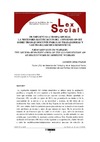Identificador persistente para citar o vincular este elemento:
https://accedacris.ulpgc.es/jspui/handle/10553/60117
| Título: | De sirvientas a trabajadoras: La necesaria ratificación del Convenio 189 OIT sobre trabajo decente para las trabajadoras y los trabajadores domésticos | Otros títulos: | From servants to workers: the necessary ratification of the ILO Convention 189 on decent work of domestic workers | Autores/as: | Grau-Pineda, Carmen | Clasificación UNESCO: | 560507 Derecho público 560504 Derecho constitucional 560508 Derecho privado |
Palabras clave: | Cuidados Care jobs Trabajo doméstico Trabajo decente Derechos humanos, et al. |
Fecha de publicación: | 2019 | Publicación seriada: | Lex Social: Revista de Derechos Sociales | Resumen: | La regulación española del trabajo doméstico se debate entre la aceptación pacífica y sosegada de unos aspectos y la inacción político-legislativa frente a otros que resultan más conflictivos por razones diversas. Recién aprobado el Convenio 189, por allá por junio de 2011, era generalizado no dudar ni de la oportunidad de la norma y de su necesidad y justicia, ni del éxito de su ratificación. Sea como fuere, a día de hoy España no ha ratificado el Convenio 189 pese a haber dado los primeros pasos para adecuar su normativa interna nada más aprobarse en mismo y antes de que entrara en vigor. Da la sensación de tratarse de un Convenio que ha caído en el olvido y que, salvo la insistencia recurrente del todavía incipiente movimiento asociativo, ha sido imbuida por una desidia que imposibilita la necesaria acción política. Que España podría haber ratificado el Convenio 189 desde el día siguiente a su aprobación y haber llevado a cabo las modificaciones/adaptaciones normativas precisas sin solución de continuidad, nadie lo pone en duda. Pero no se ha optado por esa posibilidad y, en estos momentos de impasse, conviene insistir en que la ratificación del Convenio 189, además de ser una cuestión de justicia social, es importante también en términos económicos y de seguridad social. The Spanish regulation of domestic work is torn between the peaceful and calm acceptance of some aspects and the political-legislative inaction against others that are more conflictive for different reasons. Having recently approved Convention 189, back in June 2011, it was generalized not to doubt either the timeliness of the norm and its necessity and justice, or the success of its ratification. However, today Spain has not ratified Convention 189 despite having taken the first steps to adapt its internal regulations as soon as it was approved and before it entered into force. It gives the sensation of being an agreement that has fallen into oblivion and that, except for the recurrent insistence of the still incipient associative movement, has been imbued with a laziness that precludes the necessary political action. That Spain could have ratified Convention 189 from the day after its approval and have carried out the precise modifications/adaptations of regulations without continuity solution, nobody doubts it. But this possibility has not been chosen and, in these moments of impasse, it is important to insist that the ratification of Convention 189, besides being a matter of social justice, is also important in terms of economic and social security. |
URI: | https://accedacris.ulpgc.es/handle/10553/60117 | ISSN: | 2174-6419 | DOI: | 10.46661/lexsocial.4201 | Fuente: | Lex social [ISSN 2174-6419], v 9 (2), p. 47-90 |
| Colección: | Artículos |
Visitas 5
443
actualizado el 15-ene-2026
Descargas
235
actualizado el 15-ene-2026
Google ScholarTM
Verifica
Altmetric
Comparte
Exporta metadatos
Los elementos en ULPGC accedaCRIS están protegidos por derechos de autor con todos los derechos reservados, a menos que se indique lo contrario.
